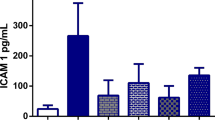Abstract
Starting from the concept that lipopolysaccharide (LPS)-associated hepatotoxicity involves the action of reactive oxygen species, the present study was conducted to test whether vitamin E, a lipophilic antioxidant, prevents LPS-induced hepatic microvascular dysfunction and liver injury. Fifty-two rats were divided into three groups and fed diets containing 0 (n=16), 75 (n=18) or 8000 mg (n=18) α-tocopherol acetate/kg food for four weeks. At 1 h and 6 h after intravenous LPS-exposure (10 mg/kg E. coli LPS) hepatic microvascular response and liver injury were assessed by the analysis of Kupffer cell phagocytic activity, leukocyte-endothelial cell interaction and nutritive sinusoidal perfusion (intravital fluorescence epi- illumination technique) as well as bile flow, serum liver enzyme activities and tissue histomorphology. In animals fed with 75 mg vitamin E/kg (standard diet), LPS caused hepatic Kupffer cell activation (increased phagocytic activity) and hepatic microvascular leukocyte activation, with stasis in sinusoids and adherence in postsinusoidal venules (1 h) followed by leukocytic infiltration into tissue (6 h) and progredient sinusoidal perfusion failure (6 h). Hepatic microvascular injury was accompanied by reduced bile flow and enhanced liver enzyme release. Vitamin E-enriched diet (8000 mg/kg) and even vitamin E-deficient diet did not significantly affect LPS-induced hepatic microvascular cell activation and perfusion failure. Thus, we conclude, that vitamin E is not effective to protect from endotoxin-induced hepatic microvascular dysfunction.
Similar content being viewed by others
Author information
Authors and Affiliations
Additional information
Received 7 November 1996; received after revision 30 December 1996; accepted 20 January 1997
Rights and permissions
About this article
Cite this article
Rücker, M., Finckh, B., Kohlschütter, A. et al. Dietary vitamin E does not protect from endotoxin-induced hepatic microvascular dysfunction. CMLS, Cell. mol. life sci. 53, 294–302 (1997). https://doi.org/10.1007/PL00000607
Published:
Issue Date:
DOI: https://doi.org/10.1007/PL00000607




